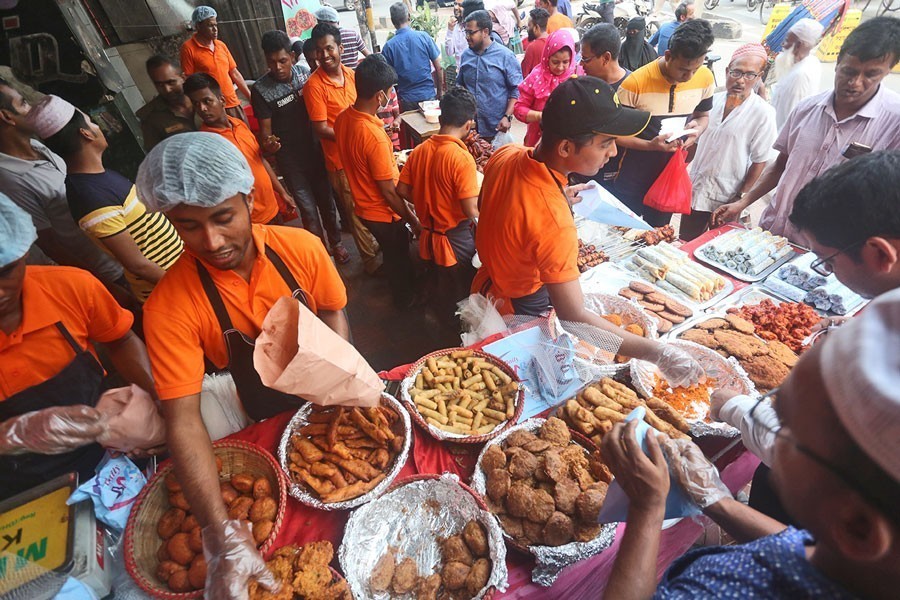The sales of food through online orders got a boost amid the coronavirus pandemic, especially during lockdowns, and the trend has continued as the customers are trying to evade severe traffic jams during Ramadan.
Some restaurateurs believe a certain number of customers have developed a taste for food from specific restaurants, keeping the online food delivery business running, reports bdnews24.com.
Sarishabari Biriyani opened in the Shia Masjid area of Mohammadpur two years ago. They initiated a home delivery system in Ramadan in the neighbourhood at the onset of the coronavirus pandemic. Although the pandemic has ebbed, they have not discontinued the home delivery services.
“People could not leave their homes at that time due to lockdown and now they want home delivery to evade the traffic jam during Ramadan,” said Md Rifat, manager of the food shop that sells Halim and Biriyani with a promise to deliver at homes in the area within half an hour from the placement of the order.
Orders peaked during Ramadan in the past two years amid the pandemic and fell slightly this time, but food deliverymen still brave the unbearable traffic jams in the city to deliver Iftar items before sundown.
A private company employee, Amzad Hossain still depends on online purchases for Iftar. “It’s an ordeal to go out to buy Iftar because of the severe traffic jams. I liked the quality of food from a few restaurants and eateries in the past two years. So I am still ordering from them. What’s the point of going out if I can shop sitting at home?” he said.
Sohani Islam, who works in an NGO, also prefers to order from her favourite food shops online for home delivery. “I trust two or three shops for their food quality and order Halim or Biriyani from them [online]. Also, it’s due to traffic jams that sometimes I order online. I still buy some special items in person to check the quality myself.
Maruf Hasan bought Iftar online during Ramadan in the last two years. This year he combines online orders and in-person purchases. “Not all items available in a shop are good. Last two years I bought Halim for Iftar from different shops. This year I am buying from two of those shops. After I ate [the Halim] I felt the quality is good and I don’t have to check it in person before buying,” he said.
Sabrina’s Dine, which takes orders online for home delivery, has developed a base of customers like Maruf. Sabrina Karim has been managing the business from her home at Lalbagh in Old Dhaka for five years. She got a huge number of orders for Iftar during Ramadan in the last two years and the demand has remained the same this year.
As the pandemic situation has improved, Sabrina, however, is facing problems with the delivery charges, she said.
“During the lockdown, people were ready to pay whatever they needed for getting the food. But they are reluctant now and want to pay less delivery charge,” she said.
Though her business is run in Old Dhaka, Sabrina delivers her food to almost all neighbourhoods in Dhaka.
Nababi Bhoj Executive Director Kamrul Hasan Chowdhury believes that those still ordering online are the “fixed customers”.
At least 20-25 percent of their sales derive from online orders, he said. “Our online sale has dropped in comparison to last two years as people could not dine in at that time. Now the restaurant is open and customers are buying food in person. But those still ordering online are the “fixed customers”.
Saurav Dey, head of PR at Foodpanda, Bangladesh, said the growth of online Iftar orders has been steady this year as sales remained the same as it was during the lockdown.
“We’re continuing the special arrangement called ‘Iftarwala’ this year too. This offers the yummy Iftar items from different restaurants in Uttara, Bashundhara, Banani, Gulshan, Dhanmondi, Mohammadpur, Baily Road and Mirpur,” he said.
He believes people opt for the online food orders to evade traffic jams and save work time.
Some said many customers are back purchasing food in person, pushing the number of online orders down.
“People are ordering food for Iftar, but the bulk of orders has dropped in comparison to the last two years,” said Md Aleem, a delivery man in Pathao Food.
Bismillah Hotel in Mohammadpur started selling food online during the pandemic and continued the service after the number of coronavirus cases fell. But online orders have slumped, said Akram Ali, manager of the hotel.
Abhishek Sinha, CEO of Khazana Restaurant in Gulshan, said online orders for Iftar from their restaurant have dipped in comparison to the last two years. He said some people who are “well aware of the quality of the restaurant’s food” order online to save time.
“This year the restaurant is open and naturally people want to buy food in person. We’ve got a live kitchen. People are ordering there and taking it home. Deliveries are on but on a limited scale,” he said


